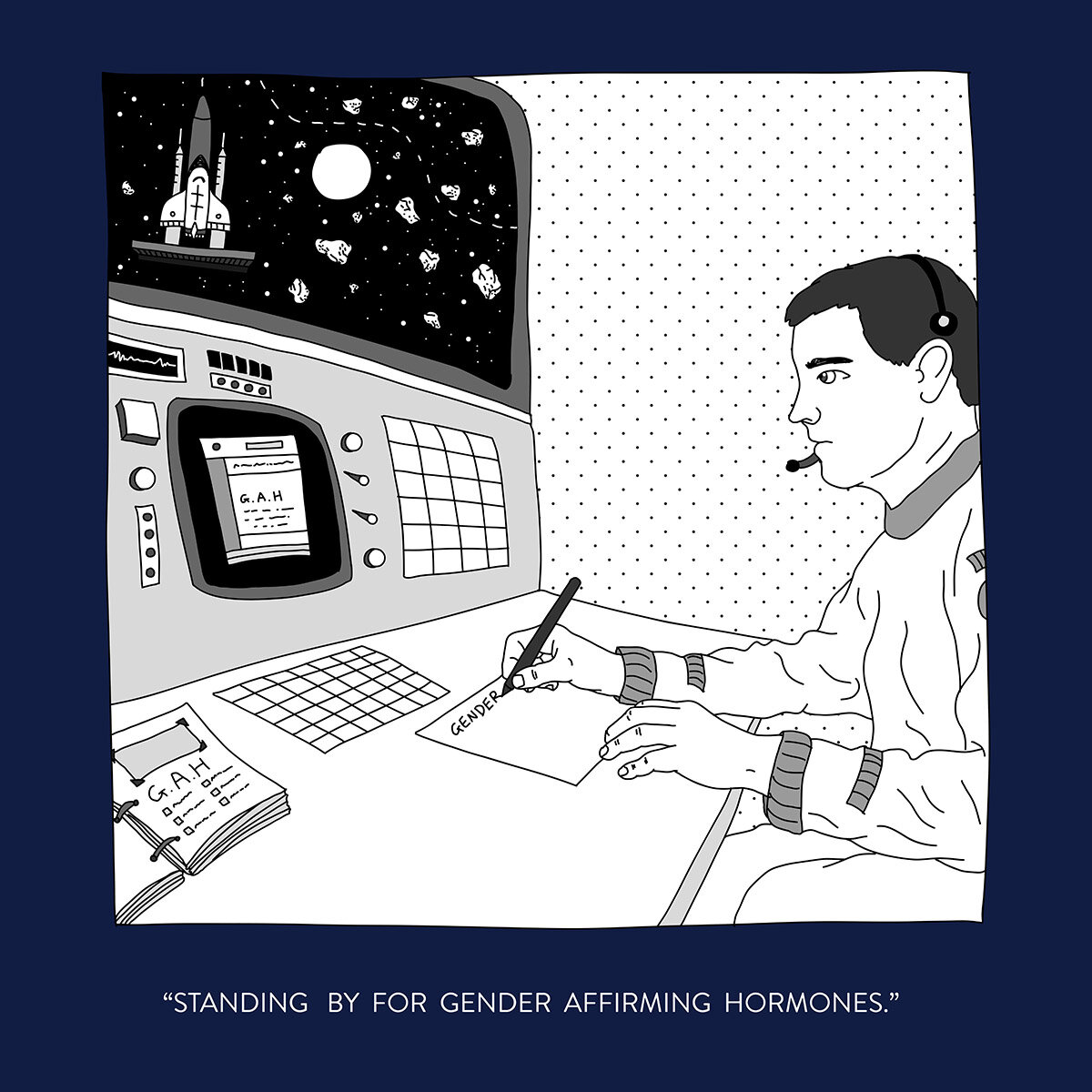Hormones 101
On this page:
What are hormones? What hormone therapies are there? Downloads
Illustration by Samuel Luke Art
For many trans and gender diverse people, hormonal affirmation is an important part of how we see, care for, and envision ourselves.
Exactly what this means can vary from person to person, and there is no one correct path to hormonal affirmation. Using hormones doesn’t make you the woman, man, or non-binary person you already are but most trans or gender diverse people using gender affirming hormones report high levels of satisfaction 1 2.
For people who experience dysphoria, hormones often alleviate this.
TransHub uses the terms ‘masculinising’ and ‘feminising’ hormones to describe the physical effects of hormonal affirmation, recognising that not everybody will use them with the intention of masculinising or feminising, and that bodies are not inherently masculine or feminine due to their hormonal makeup.
These terms are imperfect descriptors for categories of hormones and their effects, but do not intend to denote the specific genders.
What are hormones?
Hormones are chemical messengers that exist in most bodies, sending signals throughout the endocrine system and brain that tell different parts of the body how to function.
Hormones Australia writes that “[hormones] are signals that tell the body to act in a certain way. Hormones are recognised by their target receptors in a “lock and key” system. Each hormone (key) fits exactly into its receptor (lock). Only those parts of the body that have the receptor (lock) can respond to the hormone (key). This is why hormones affect some parts of the body, but have no effect on others. 3”
Cisgender endosex and some intersex people have bodies that produce hormones, and those hormones affect their bodies in ways that are usually in line with how they see themselves. For trans people, our bodies produce hormones that can create changes that we don’t like, or make us feel uncomfortable, dysphoric, or like our bodies are rebelling against us.
If sought, hormonal affirmation is relatively simple, can create a lot of change from a small amount of input, and our communities have been doing it for a long time, so we have a good understanding that it’s effective and safe.
GPs are able to initiate and continue gender affirming hormonal therapy for people age 18 and above. For more information about how to get started, visit Starting Hormones.
Illustration by Samuel Luke Art
What hormone therapies are there?
The type of hormone therapy you might end up taking depends on several factors, the main one being what hormones your body is already producing (or potentially will produce in the future), which is often but not always determined by the gender you were presumed at birth.
The medications and doses you take can also depend on factors like previous history of hormonal therapy, possible interaction (contraindications) with other medications or health conditions, and simply what you want to take.
You may want to start hormones and take them for the rest of your life, or go on and off them over time based how much you’re seeking to feminise or masculinise. It’s also possible to go on hormones for a while, see how you feel, and then change up your medication or dose, or stop altogether. Some of the changes that result from hormone therapy are reversible, and others are irreversible, and you can find out more about each of these on the pages below.
There is no one right way to be on hormone therapy, or one correct set of hormonal medication to take - it’s your body and your story to tell.
Hormone blockers
Hormone blockers (or puberty blockers) are medications that prevent the release of hormones in your body. This means estrogen or testosterone stops, or doesn’t begin, having an effect on your body.
Find out more about hormone blockers here.
Masculinising hormones
Masculinising hormones are testosterones. They can affect fat redistribution, body and facial hair growth, and lowering the pitch of the voice.
Find out more about masculinising hormones here.
Feminising hormones
Feminising hormones are estrogens, and progesterones. They can affect fat redistribution, softening and clearing of skin,and shifts in mood.
Find out more about feminising hormones here.
Downloads
How do I start hormones? A guide for trans & gender diverse people - TransHub [ Plaintext version ]
Doctor letter: starting hormones - TransHub
Doctor letter: continuing hormones - TransHub
Fact Sheet: Trans children and medical treatment: the law - Inner City Legal Centre
Links
1 Long term hormonal treatment for transgender people - Martin den Heijer, Alex Bakker and Louis Gooren
2 Australian TGD Sexual Health Survey - The Kirby Institute
3 Hormones Australia - Endocrine Society of Australia
Trans children and medical treatment: the law [PDF] - Inner City Legal Centre
Position statement on the hormonal management of adult TGD individuals - Ada S Cheung, Katie Wynne, Jaco Erasmus, Sally Murray and Jeffrey D Zajac
Australian Standards of Care and Treatment Guidelines for Trans and Gender Diverse Children and Adolescents v1.1 [PDF] - The Royal Children’s Hospital Melbourne
Re: Imogen (No. 6) (2020) FamCA 761 (10 September 2020). - Family Court of Australia judgement


